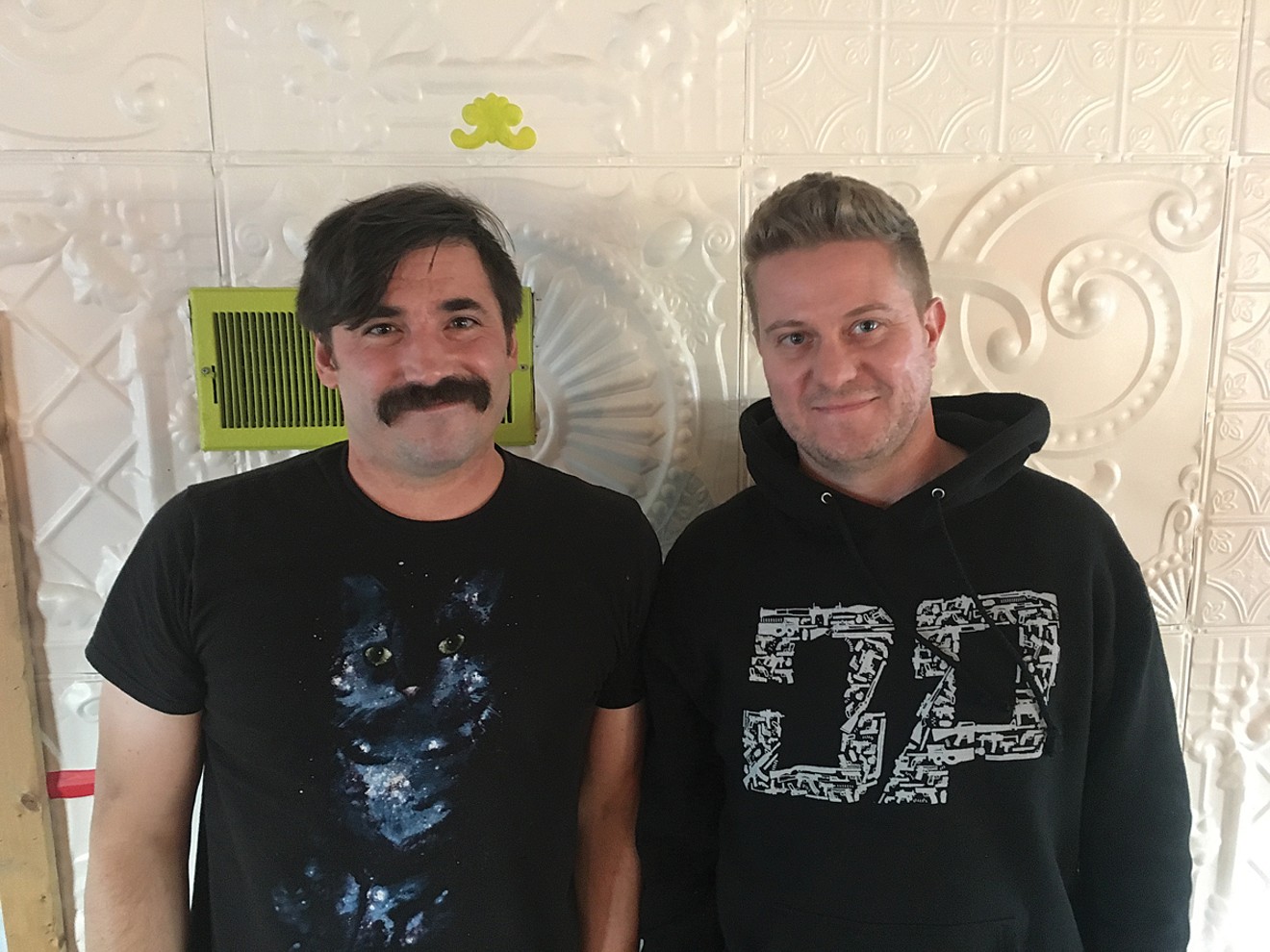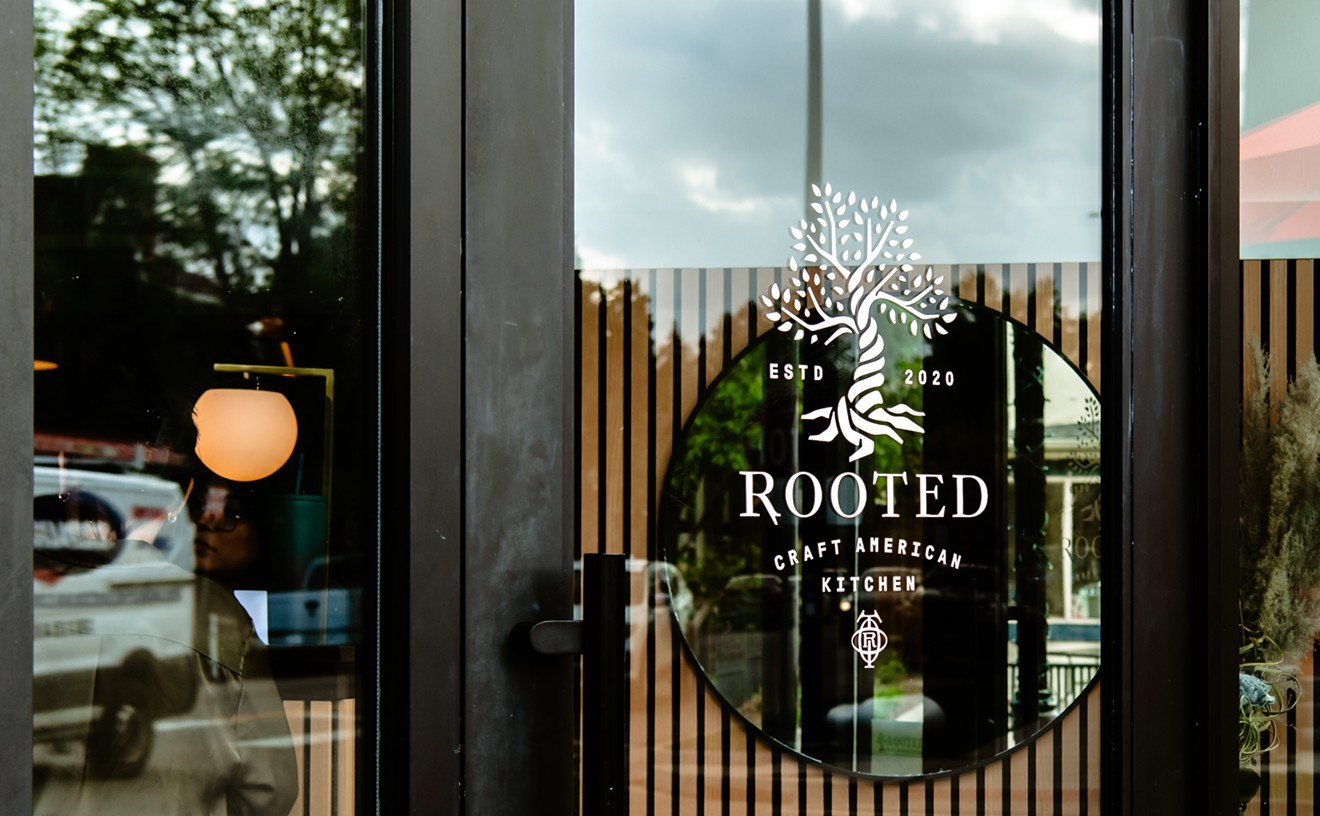Bo Porytko and Dan Lasiy planted Rebel in an old dive bar at the edge of RiNo two and a half years ago, and they’ve been trying to persuade Denver to eat more adventurously ever since. Self-described opposites in their kitchen-management style, the lifelong friends nevertheless share creative control, fueled by a common love for odd cuts of meat and novel combinations that are impossible to find elsewhere. In this interview, they talk about why you should give their off-cuts a chance, what they’re doing to survive the Brighton Boulevard construction slowdown, and why testicles are easier to sell than tripe.
Westword: You’re business partners and co-chefs in this restaurant. How did you come together on this project?
Bo Porytko: Dan is my oldest friend in the world — we’ve known each other since pre-K. We had a passion for the same thing and decided we had to work together. He tried to convince me to come here to Denver; I tried to convince him to move to California, where I was living. Then this opportunity came up. We were originally supposed to put Rebel in Black Shirt Brewery. So it’s not like he won....
Dan Lasiy: I did win.
Sounds like Black Shirt didn’t quite work out — how did you end up here, on the edge of RiNo?
Porytko: Black Shirt was growing. Our handshake deal didn’t work out; they needed all the space to expand. We did a Kickstarter — the scroll on the wall is all of our early supporters — and that became the seed money for this space.
Lasiy: I live in Five Points, and I did while we were checking this out. We looked everywhere.
Porytko: All the Larimer spaces were out of our budget.
Lasiy: This was my main route to and from the highway. I saw a sign in the window, and it was instantly like, this is our spot. We like the grit, the stuff that’s been around.
What was the original vision here?
Lasiy: It’s always been a loose conversation. First, you have to have the space work for you. You can’t be doing a smokehouse in downtown Denver; it’s not going to work out. The thing that I always wanted to do is not pigeonhole ourselves to one cuisine — Italian, steakhouse, Colorado. This was a soul-fulfilling restaurant, more for ourselves than everyone else. It was, “Let’s just do whatever we want, whenever.” We had the plan of underutilized cuts of meat. We always wanted to do the half pig’s head. We’re both Ukrainian, so we always wanted to use that as part of the influence — pierogis, pickles, stuff like that.
Porytko: Stuff our parents gave us from age eight on, including vodka. We just get bored easily. The opportunity to do what we wanted was exciting. This place was also an homage to places in Brooklyn, in Bushwhack and Greenpoint, from when we first started going there. That’s where we were from — well, New Jersey. People there didn’t have to be the Manhattan restaurants; they could be grittier.
You certainly became quick critics’ darlings for all the unusual stuff on the menu. Have you had to evolve?
Lasiy: We didn’t evolve in the best way. We saw a big number of people coming in, and they were scared, no matter how much we talked up the menu. So we pulled the trigger and put a burger on, and it flew out the door.
Porytko: And it’s a good burger. We grind it ourselves. It started as one-third beef heart and two-thirds brisket; now it’s just brisket. Heart adds good, iron-y flavor. We put the time and effort into it, but we fucking hated it.
Lasiy: We also had this $13 grilled cheese. It was a social experiment. I knew the answer, but I didn’t want it to be the answer, in that it’s $13, but Friday and Saturday, we always have like ten grilled cheese sandwiches on the board. It’s like I invented it.
Porytko: We still had weird things on the menu, but 30 or 40 percent of what we sold were the burger and grilled cheese.
And you just rolled out sandwiches, under an alter ego, Obey.
Porytko: It was a necessity, since Brighton Boulevard is so fucked up. We’re trying to figure out more revenue sources. But we’ve been trying to figure out lunch for a while.
Lasiy: I was creeping on Instagram one day, and I was like, why don’t we just open this window and sell sandwiches?
Porytko: I thought the window was painted shut. We wish we’d thought of it earlier in the summer.
So this Brighton Boulevard construction is killing you right now?
Porytko: Even a lot of regulars tell us they’re staying out of the neighborhood.
Lasiy: I don’t blame them. I want to sometimes, too. Sometimes this street is down to one lane, and it takes half an hour to go less than a mile.
Porytko: This happened all at once; normally it’s piecemeal. Everyone on the street is having the same issues. We’re trying to do lots of events to bring people here. We did a Stranger Things party and a dim sum thing. We did a sushi thing for our two-year anniversary. We’re figuring out other ways to get people in the door. People get really excited for the events. We don’t want to dumb down the food. We did this basic-bitch brunch, but still served weird food. We tend to make the food even weirder, but people get excited about it.
Speaking of, you’re currently in the midst of a pop-up.
Porytko: Gary Kim owned a ramen shop, and we did a ramen pop-up with him last year. This year, we said, hey, do you want to come back? We’re doing Asian street-food and market food, which is why it’s called Night Market. It runs until December 2, with a new menu every week. After that, we’re going to go back to doing weird things. We’ve learned that if you call it a pop-up, people get more excited. They’re willing to be more adventurous.
So if the next year is about getting through the construction lull, what’s the longer-term plan? Where do you want to see the restaurant go?
Porytko: [Sigh]
Lasiy: Are you going to write in that sigh?
Porytko: I want people to try the adventurous shit that we put on the menu. I’d like to do more things like Night Market, to get people out of their comfort zone more. Maybe that’s the neighborhood changing, but I want to feel like we’re cooking for ourselves again.
Lasiy: I agree. It’s hard. We’re a destination restaurant — you’re not walking around this restaurant. Even yesterday, we had a couple come in, and they turned around and walked out when they saw the restaurant. If you come all the way here, just try something! So what if you’re out $15? Part of the reason we use underutilized cuts of meat is not to be weird, but because it’s more sustainable. Those animals have been butchered already for their better cuts, and I don’t want to create more need for other animals to be butchered. I want people to ask, why do you eat this? You’re not going to convince people to stop eating meat, but if you can convince someone that beef tongue is just as good as short rib, maybe they’ll think twice about what they’re buying or ordering. We want to start that process. People who are coming in here are likely going to lengths to help themselves sleep at night or have good Instagram posts. But if you shop at Whole Foods, you can go in the middle of December in Colorado and buy mangos and avocados. What are you doing for the environment? What are you doing for the local economy?
How do you foster that kind of change in Denver? How do you get people to be more adventurous? Or what would you like to see here?
Porytko: It’s funny — Denver is getting a reputation for being a food city, but it’s always the same five or six restaurants mentioned. Denver is getting tastier, but it’s not getting more adventurous or experimental. People seem to be bringing other concepts here from other cities — it seems brand-new to Denver, but it isn’t. There are not a lot of places that are doing something wildly unique. I want more of that.
Lasiy: We’re still trying to figure that out. I’ve only been here for ten years, but the landscape now is insanely different. One hundred restaurants open in one year — it’s like ADD overload. People don’t know where to go, and they forget about restaurants that are out there. I get it — you’ve been meaning to go to this place for months, but this other place is in your face. So guess where you’re going? We’re becoming a bigger city daily, but we have to bridge the gap.
Anything on your menu that you think people are missing out on?
Lasiy: I wouldn’t say specific dishes. But even on this pop-up menu, we have fried tripe, and people say, “I don’t like tripe.” I think we do a good enough job that even people who don’t like tripe will like this. On our last menu, we had kara-age chicken heart. Some people would be scared, but I just want them to try it.
Porytko: We’re doing globally inspired food now. A lot of it is food that people have nostalgia for. We turn it on its head just enough, but make it delicious. We did General Tso’s Rocky Mountain oyster, and it sold really well.
Lasiy: Turns out testicle is an easier sell than tripe.
Porytko: Even things that are unapproachable on our menu are approachable.
Rebel Restaurant
3763 Wynkoop Street
303-297-3902
rebelrestaurantdenver.com
Hours: 5 to 10 p.m. Monday through Thursday, 5 p.m. to 11 p.m. Friday, 3 p.m. to 11 p.m. Saturday
[
{
"name": "Air - MediumRectangle - Inline Content - Mobile Display Size",
"component": "12017618",
"insertPoint": "2",
"requiredCountToDisplay": "2"
},{
"name": "Editor Picks",
"component": "17242653",
"insertPoint": "4",
"requiredCountToDisplay": "1"
},{
"name": "Inline Links",
"component": "18838239",
"insertPoint": "8th",
"startingPoint": 8,
"requiredCountToDisplay": "7",
"maxInsertions": 25
},{
"name": "Air - MediumRectangle - Combo - Inline Content",
"component": "17261320",
"insertPoint": "8th",
"startingPoint": 8,
"requiredCountToDisplay": "7",
"maxInsertions": 25
},{
"name": "Inline Links",
"component": "18838239",
"insertPoint": "8th",
"startingPoint": 12,
"requiredCountToDisplay": "11",
"maxInsertions": 25
},{
"name": "Air - Leaderboard Tower - Combo - Inline Content",
"component": "17261321",
"insertPoint": "8th",
"startingPoint": 12,
"requiredCountToDisplay": "11",
"maxInsertions": 25
}
]












